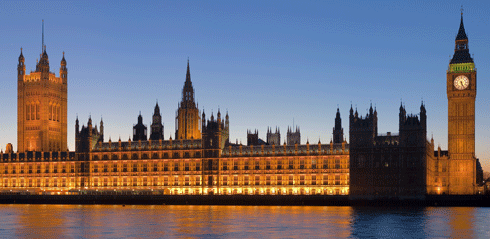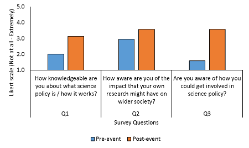The science-policy interface
In a survey of QMUL researchers that revealed that were ‘slightly’ knowledgeable about science-policy but ‘not at all’ aware of how they could get involved, Elly Tyler, Postdoctoral Research Assistant at the Blizard Institute, took it into her own hands to organise 'The science-policy interface' event, bringing together science-policy professionals and researchers in order to ask the questions: How researchers can contribute and why we should. Below, she shares her insights.

By Elly Tyler, PhD
As an MRC policy intern at the Academy of Medical Sciences, I experienced first-hand how science-policy professionals inform policy-making by communicating evidence from the scientific community.
During this time, it became clear to me how little I had previously understood about the interface between science and policy, and I realised that if other researchers were similarly uninformed, then a gulf currently exists between research staff and policy-makers.
It is vital that researchers engage with policy-makers in order to help draft well-informed evidence-based policy. However, policy-makers may be unsure whom to approach for expertise, and researchers may be unaware of the breadth of topics on which the Government calls for evidence and how they can get involved.
In fact, a survey of QMUL researchers revealed that they were ‘slightly’ knowledgeable about science-policy but ‘not at all’ aware of how they could get involved (Figure 1).
To try to address this knowledge gap, I hosted ‘The science-policy interface: How researchers can contribute and why we should”, to bring together science-policy professionals and researchers in order to ask the questions:
How can we, as researchers, engage with science-policy?
Sarah Barnes from the QMUL Public Engagement Team advised that we should prepare to influence policy early on in our research by making our research visible, talking to our research funders, and using the resources available at QMUL.
Dr Lorna Christie from POST, Parliament's in-house source of impartial analysis on science and technology policy issues, highlighted a number of routes to engaging with Parliament:
- POST frequently engages with academics to inform their POSTnotes. Lorna advises you to contact them if you have a particular POSTnote topic in mind.
- House of Commons and Lords Select Committees announce inquiries and invite the public, including academics, to submit written evidence.
- After the second reading of a bill, it is often referred to a Public Bill Committee for further scrutiny. They may choose to receive written and oral evidence, including from academics.
- All Party Parliamentary Groups (APPGs), cross-party groupings of MPs with an interest in a specific topic, carry out their own inquiries for which they sometimes use evidence.
If you would like to learn more about science-policy, Lorna recommended POST’s fellowship programmes in which PhD students are fully-funded to work at POST for three months. If you are a senior academic, fellowships (six to twelve month positions) are available to enable you to work on a project with Parliament staff.
Becky Purvis from the Royal Society provided an overview of the current landscape of learned bodies: including the Academy of Medical Sciences; Royal Academy of Engineering; and British Academy, to name but a few. Becky emphasised the importance of interacting with these bodies as a route to engaging with science-policy. For example, as mentioned above, the Academy of Medical Sciences runs a fantastic programme offering three-month policy internship schemes for PhD students.
And why should we, as researchers, consider contributing to policy?
As Sarah Barnes noted, “over 40% of impact case studies in the last REF mentioned impact on policy as part of their narrative”. With research impact becoming an increasingly important aspect of funding application evaluation criteria, there is a need for us to engage with science-policy in order to maximise the impact of our research.
Potential REF impact case studies include raising awareness of key issues amongst MPs. According to Dr Christie, ‘much of what Parliament does has a science or research basis but most Parliamentarians do not have a research background’, so we, as researchers, can play a vital role providing expertise to MPs.
Building on this, Dr Ben Bleasdale from the Wellcome Trust presented the example of the Human Fertilisation and Embryology (Mitochondrial Donation) Regulations 2015, coined ‘three-parent babies’ in the press. Decades of fundamental research and engagement with Parliamentarians by scientists and science-policy professionals enabled the UK Parliament to successfully vote in support of mitochondrial donation in February 2015, allowing parents with rare genetic mutations to give birth to healthy babies.
As research staff at one of the UK’s leading universities, we are producing transformative research which could inform policy-making across all aspects of society. Following attendance of the event, QMUL researchers reported being ‘moderately’ knowledgeable about science-policy and ‘very’ aware of how they can get involved (Figure 1), suggesting that we’ve begun to successfully bridge this knowledge gap.
So, fellow researchers, let’s take this opportunity to get involved with science-policy, increase the impact of our research, and make a difference to the world!

Figure 1. Survey questions assessing QMUL research staff knowledge of science-policy pre- and post-event. Likert scale: Not at all = 1; Slightly = 2; Moderately = 3; Very = 4; Extremely = 5. Pre-event N=17. Post-event N=7.
Funds for this event were awarded by the Life Sciences Institute Researcher Development fund to Dr Elly Tyler (lead applicant), Dr Sheetal Inamdar, Dr Samuel Tang, and Dr Fiona McEwen.